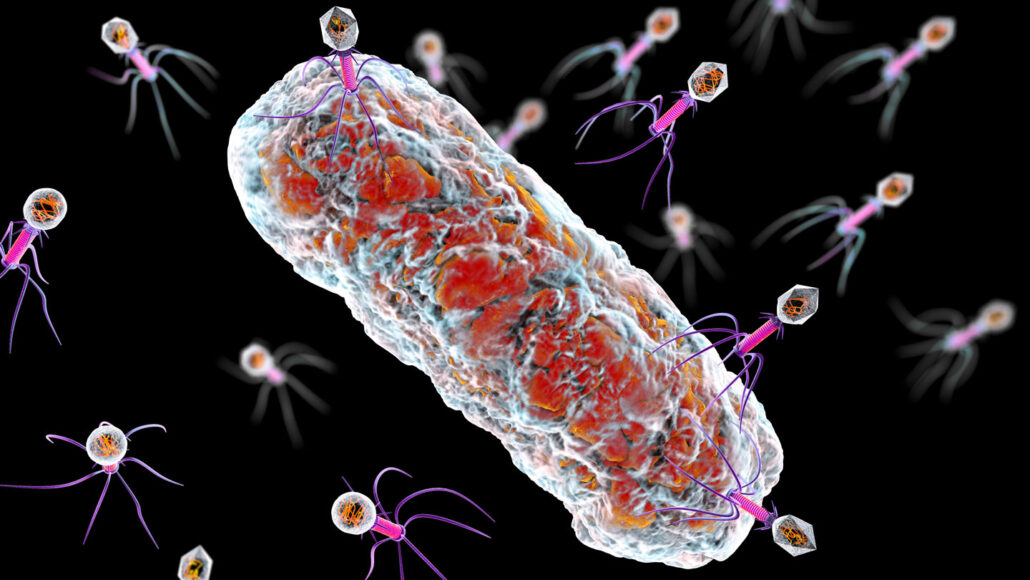
A bacteria-virus arms race could lead to a new way to treat shigellosis
When some bacteria manage to escape being killed by a virus, the microbes end up hamstringing themselves. And that could be useful in the fight to treat infections.
The bacterium Shigella flexneri — one cause of the infectious disease shigellosis — can spread within cells that line the gut by propelling itself through the cells’ barriers. That causes tissue damage that can lead to symptoms like bloody diarrhea. But when S. flexneri in lab dishes evolved to elude a type of bacteria-killing virus, the bacteria couldn’t spread cell to cell anymore, making it less virulent, researchers report November 17 in Applied and Environmental Microbiology.
The research is a hopeful sign for what’s known as phage therapy (SN: 11/20/02). With antibiotic-resistant microbes on the rise, some researchers see viruses that infect and kill only bacteria, known as bacteriophages or just phages, as a potential option to treat antibiotic-resistant infections (SN: 11/13/19). With phage therapy, infected people are given doses of a particular phage, which kill off the problematic bacteria. The problem, though, is that over time those bacteria can evolve to be resistant against the phage, too.
“We’re kind of expecting phage therapy to fail, in a sense,” says Paul Turner, an evolutionary biologist and virologist at Yale University. “Bacteria are very good at evolving resistance to phages.”
But that doesn’t mean the bacteria emerge unscathed. Some phages attack and enter bacteria by latching onto bacterial proteins crucial for a microbe’s function. If phage therapy treatments relied on such a virus, that could push the bacteria to evolve in such a way that not only helps them escape the virus but also impairs their abilities and makes them less deadly. People infected with these altered bacteria might have less severe symptoms or may not show symptoms at all.
Previous studies with the bacteria Pseudomonas aeruginosa, for instance, have found that phage and bacteria can engage in evolutionary battles that drive the bacteria to be more sensitive to antibiotics. The new study hints that researchers could leverage the arms race between S. flexneri and the newly identified phage, which was dubbed A1-1 after being found in Mexican wastewater, to treat shigellosis.
S. flexneri in contaminated water is a huge problem in parts of the world where clean water isn’t always available, such as sub-Saharan Africa and southern Asia, says Kaitlyn Kortright, a microbiologist also at Yale University. Every year, approximately 1.3 million people die from shigellosis, which is caused by four Shigella species. More than half of those deaths are in children younger than 5 years old. What’s more, antibiotics to treat shigellosis can be expensive and hard to access in those places. And S. flexneri is becoming resistant to many antibiotics. Phage therapy could be a cheaper, more accessible option to treat the infection.
The blow to S. flexneri’s cellular spread comes because to enter cells, A1-1 targets a protein called OmpA, which is crucial for the bacteria to rupture host cell membranes. The researchers found two types of mutations that made S. flexneri resistant to A1-1. Some bacteria had mutations in the gene that produces OmpA, damaging the protein’s ability to help the microbes spread from cell to cell. Others had changes to a structural component of bacterial cells called lipopolysaccharide.
The mutations in lipopolysaccharide were surprising, Kortright says, because the relationship between that structural component and OmpA isn’t fully worked out. One possibility is that those mutations distort OmpA’s structure in a way that the phage no longer recognizes it and can’t enter bacterial cells.
One lingering question is whether S. flexneri evolves in the same way outside a lab dish, says Saima Aslam, an infectious diseases physician at the University of California, San Diego who was not involved in the work. Still, the findings show that it’s “not always a bad thing” when bacteria become phage-resistant, she says.


